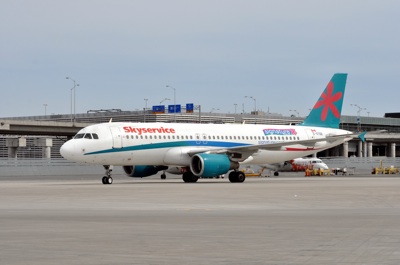
News
Skyservice shuts down
 NEWS HIGHLIGHT
NEWS HIGHLIGHT
Skyservice shuts down
Skyservice went out of business and began winding up operations last week, affecting 860 workers, as the company cited competitive changes in the Canadian vacation tour market and its high debt.
March 31, 2010 By The Canadian Press
March 31, 2010, Toronto – The Skyservice chartered airline went out of
business and began winding up operations Wednesday, affecting 860
workers, as the company cited competitive changes in the Canadian
vacation tour market and its high debt.

|
|
|
|
The airline, which once employed 1,200 people at its peak, entered receivership in Ontario Superior Court after cancelling most of its scheduled flights out of Toronto's Pearson International Airport.
"Recent changes in the Canadian vacation tour market combined with Skyservice Airlines' debt level have rendered the company unable to maintain profitable operations,'' the airline said in a statement.
"As a result, one of the company's secured lenders applied for the appointment of the receiver.''
The receiver will oversee the liquidation of the airline's assets so creditors can be repaid.
A source close to Skyservice who did not want to be identified said recent consolidation in the industry combined with high debts led to the company's demise.
"They stopped flying, they're out of business,'' the source said.
The shutdown was affected in part from ownership changes in the travel industry, which raised concerns about whether Skyservice could maintain its airline business with a key customer, travel operator Signature Tours.
One of Skyservice's competitors, Sunwing, merged with Signature earlier this year, giving the tour operator its own flying capability.
The Signature and Sunwing merger alarmed Skyservice's lenders, who called in the loan.
But the spokesman said Skyservice was not in immediate danger of losing business from the merger because its contract with Signature extended to 2013, meaning even if Signature didn't use Skyservice it would still have to pay for three more years.
"They didn't lose any business, but there was concern they were going to lose business and that set off a chain reaction. ''
Skyservice had been in talks rival tour operator Sunquest Vacations to make a similar deal, he said. But on Wednesday morning Sunquest, a Skyservice creditor, petitioned the courts to put the company into receivership.
The company was also struggling with massive debt after being purchased three years ago in a leveraged buyout by private equity firm Gibralt Capital Corp. of Vancouver.
"There was a significant amount of debt placed on the company at the time that effectively changed their business model.''
The spokesman said like many operators in the airline industry, Skyservice faced with excess capacity as consumers cut back on vacations during the recession.
The company had been attempting to negotiate cost-cutting measure with its employees but was not able to reach a deal.
While Skyservice had already started the seasonal lay-off process after coming off the peak winter vacation season, another 860 employees will lose their jobs as a result of the shutdown.
The employees are based in major Canadian cities, mostly in Toronto. The company's 17-plane fleet has been grounded.
The shutdown resulted in the cancellation of one flight that was scheduled to depart Canada for the Dominican Republic on Wednesday as well as other flights planned for April.
The company said it will work with the company's tour operator customers and others to ensure that passenger issues are resolved promptly. Skyservice is a third-party lift provider, which means it doesn't sell seats to individual customers.
Most of Skyservice's customers have made arrangements for replacement flights for travellers, the spokesman said, and those who had planned to fly with Skyservice should call their tour operators for information.
It is uncertain what long-term impact the collapse of Skyservice will have on the Canadian travel industry and whether the reduced competition will lead to a rise in prices for vacation travel.
Signature Vacations spokeswoman Janine Chapman said her company — a Skyservice client — was prepared to deal with either a continuation of Skyservice operations or a shutdown, since Signature has access to parent company Sunwing's fleet of planes.
Skyservice client Sunquest, owned by global travel giant Thomas Cook PLC, said it has organized replacement flights with Air Transat and Enerjet for customers affected by the shutdown of Skyservice flights to the Caribbean and Mexico.
"Since it is late in the winter season, a relatively small number of our passengers were booked on Skyservice flights and we have the capability to respond effectively to this situation,'' Thomas Cook North America CEO Michael Friisdahl said in a statement.
He added that travel agents and Sunquest representatives were attempting to contact customers with updated flight details by the end of Wednesday.
"The loss of Skyservice is regrettable for us and the Canadian travel industry,'' Friisdahl said.
"However, we have long-established relationships with a number of flying partners and we are able to turn to these partners to quickly and seamlessly arrange alternate flights for our customers scheduled to travel with Skyservice.''
Skyservice has been an important part of Canada's travel industry, although not one of the better-known players since it's primary role is to supply planes and seating capacity to other companies such as Signature Vacations.
Canada's major publicly traded air carriers and travel companies — Air Canada, Westjet and Transat AT — have been struggling to cope with the impact of last year's recession on the industry.
They were all dealt a major blow when Canada issued a travel warning for Mexico at the early stages of the H1N1 flu pandemic, which eventually spread around the world.
Skyservice has historically provided little information about the state of its business, which is privately owned and not required to disclose financial information to the public on an ongoing basis.
However, it has been able to step in at critical points when other Canadian airlines collapsed suddenly — quickly making its fleet of aircraft available to surviving companies that had to adjust their capacity quickly.